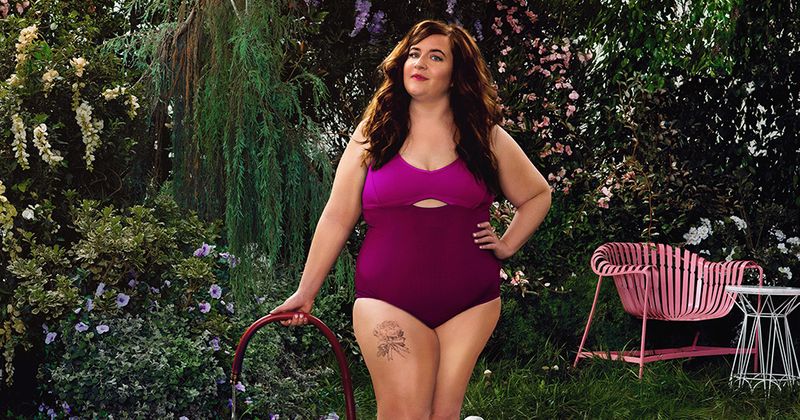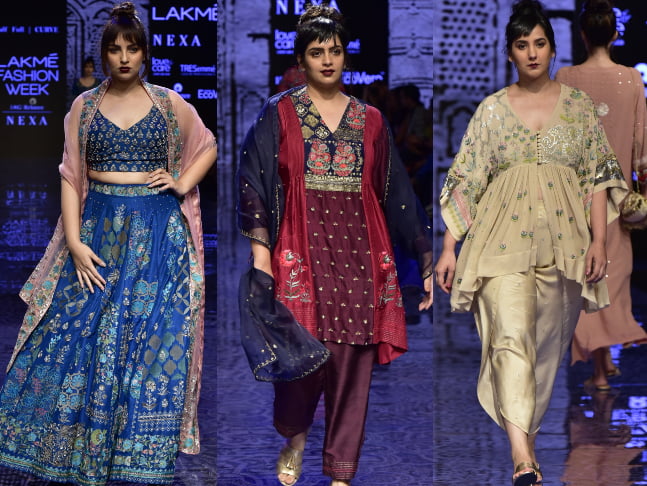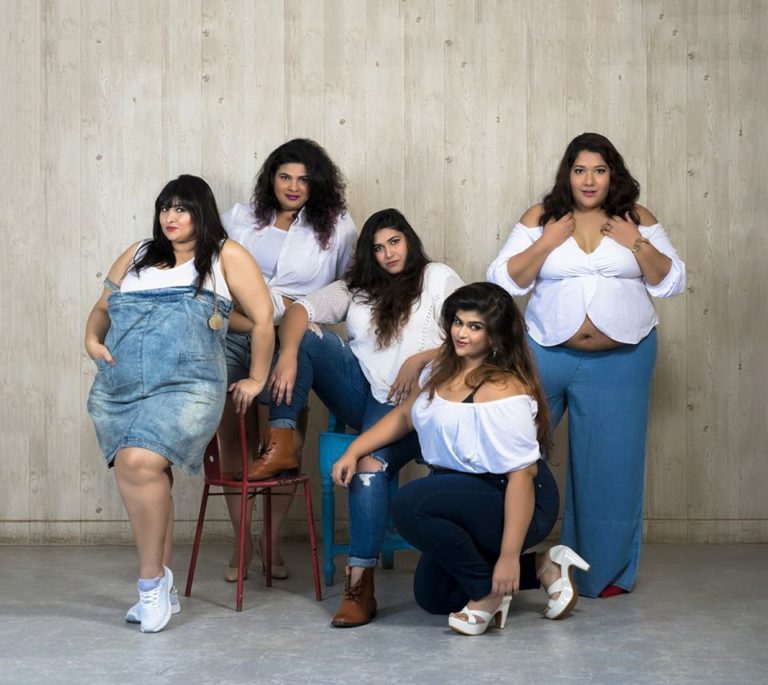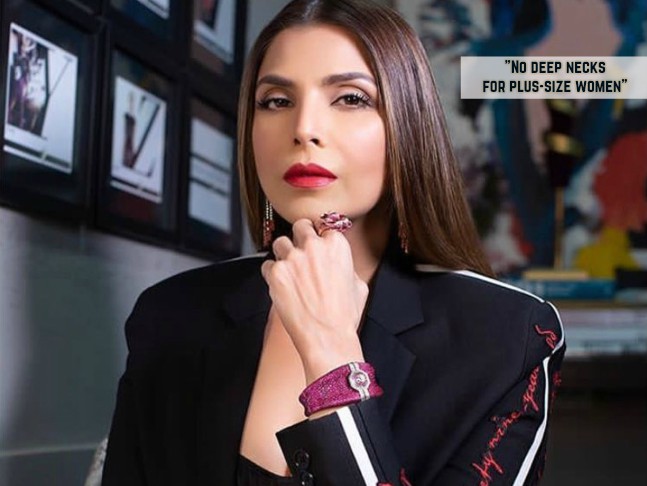Earlier this month, designer Falguni Peacock (of the famed Falguni and Shane Peacock designer duo) in an interview with Good Times, was asked as to what advice she would give to plus-sized brides looking for their ideal bridal trousseau. Her reply was, “Obviously I won’t blatantly tell her to lose weight. I would say you have enough time, work on it. I think it’s pretty easy to lose a couple of inches or so.” When the anchor tried to get Falguni to answer her first question by asking her what these brides should do if they can’t lose weight and what should they keep in mind while picking up clothes, the designer went a step ahead and told plus sized brides to stay away from fitted lehengas and deep necks.
The short clip of the interview soon went viral on social media, which led to the designer receiving a lot of flak for her comments. Falguni Peacock has since apologized, but let’s be very honest, fat women aren’t surprised. Ever since fashion as we know it has existed, the unnecessary policing of fat women and their fashion choices has too.
Falguni Peacock certainly isn’t the only designer who thinks that the only fashion choice fat women should make is to lose weight. Karl Lagerfeld, during his illustrious and equally controversial career, was quite vocal about how much he didn’t want fat women walking on runways. “No one wants to see curvy women,” Lagerfeld had reportedly told Focus magazine back in 2009.
It is now 2019. The body positivity movement is growing stronger each day. Yet, fat women find themselves at the losing end of their constant battle with fashion. From people frowning upon Nike’s decision to include plus-sized mannequins in their stores to the Internet losing its collective mind over Tess Holliday gracing Cosmopolitan’s cover last year, fat women often have to deal with their fair share of fatphobia in the fashion industry. Even if you were to look for genuine fashion advice for fat women on the internet, you’d be surprised to discover that more often than not, it is deeply fatphobic and not quite body positive.
It is now 2019. The body positivity movement is growing stronger each day. Yet, fat women find themselves at the losing end of their constant battle with fashion.
Why are we still asking fat women to dress in all black like a Victorian widow to look slim? Why are we still letting magazines get away with their “Look Instantly Thinner” How-Tos? The only thing such ‘advice’ tells women (of all sizes, in fact) is that their ultimate goal should be to look thin. There aren’t much words wasted on being comfortable in one’s own body and being proud of whatever one chooses to wear.
This is not to say that plus sized fashion remains limited to shapeless, baggy, and lackluster fabrics disguising themselves as clothes. The body-positive community has long been at the forefront of this battle. As plus sized representation in the media increases, so does the demand for more inclusive size options.
Some good examples from recent pop culture would be Annie, the protagonist of Hulu’s Shrill, and Kat Hernandez from HBO’s teen drama Euphoria. Annie (played by the brilliant Aidy Bryant- who has now started her own plus sized clothing line) regularly wears brightly colored clothes, her dresses usually end up above her knees and while Annie does sometimes go down the path of hide don’t show, she also shines in her shimmering sequined dress and her cute button downs. Kat does go through a makeover, but it is hardly the trademark Hollywood makeover that you’d expect. It is refreshing to see a fat girl transformation on TV without the drastic weight loss montage. Kat rocks tight fitted clothes as brilliantly as she rocks deep necks.

Image Source: Meaww

Image Source: Pinterest
Plus sized fashion bloggers like Amena Azeez (@fashionopolis.in) and Tanvi Geetha Ravishankar (@thechubbytwirler) have shown, time and again, that being fat and fashionable aren’t mutually exclusive. Earlier this year, at the Lakmé Fashion Week Winter/Festive 2019, Rixi and Tinka Bhatia unveiled their plus sized collection “Gulab Bagh”. The sisters also run an online store called ‘half Full CURVE’ which offers a wide range of sizes to their customers.
Also read: Reclaiming My Fat Body From The Fatphobes

While all of this is surely a cause for celebration, plus size fashion still largely remains restricted to either online stores like SHEIN, StalkBuyLove or to an expensive designer label, whose target demographic is usually urban, upper class women. What few retail stores do sell in lieu of plus sized clothing tends to be on the lower side of what is typically considered to be plus sized.
Why are we still asking fat women to dress in all black like a Victorian widow to look slim? Why are we still letting magazines get away with their “Look Instantly Thinner” How-Tos? The only thing such ‘advice’ tells women (of all sizes, in fact) is that their ultimate goal should be to look thin.
Plus size models have it worse. In India, even more so. Not only they have to fight trolls at every turn, they also get paid less or none at all. Neha Parulkar, a plus size model from Mumbai told Huffington Post, “At Lakmé Fashion Week, brands would pay thin models, but wouldn’t pay plus-sized ones because they thought, and still think, that they’re are giving us exposure, and we need them, they don’t need us. Even when they do pay, brands pay thin models way more than us. Most brands just want to give us their clothes in exchange for our work. My first paid assignment was in 2017, and I was so thrilled because more than the money it was about knowing that my work and I were of value.”

On paper, up and coming designers and brands do somewhat understand the need for more size-inclusive options, but their shelves and stores fail to reflect the same. While their supposed inclusive body positive campaigns are lauded on social media, their size charts often remain limited to an XXL.
Also read: Nike’s New Plus Size Mannequin Says You Can Be Fat and Fit
Body positivity doesn’t need to be a marketing tool for designers and brands. Fat women do not need to settle for token fat fashion. They have always been fashionable and will continue to be. If there isn’t a space for them to express themselves, they will form one. If existing brands won’t cater to their needs, they will, much like Bryant, create their own.
About the author(s)
Purnima is a wannabe writer and a want-to-be cat mom.





very nice post
I hope that inclusiveness will occur.